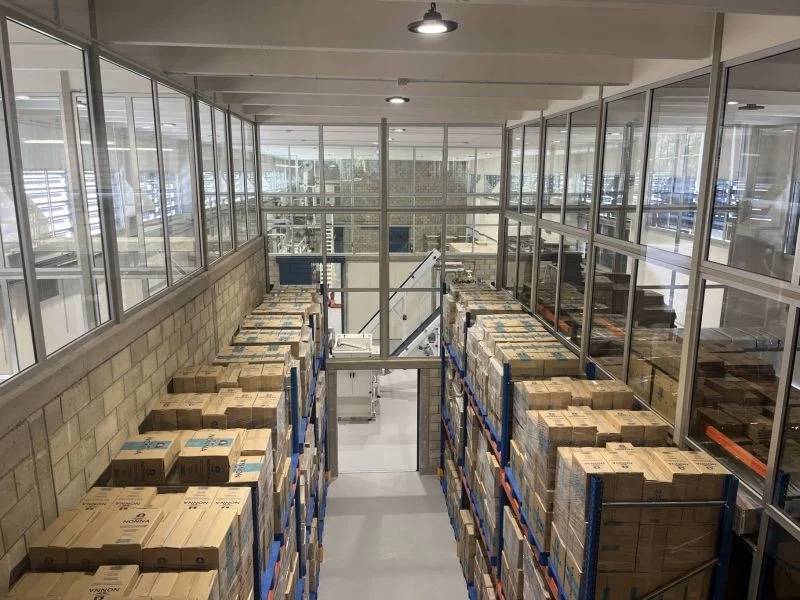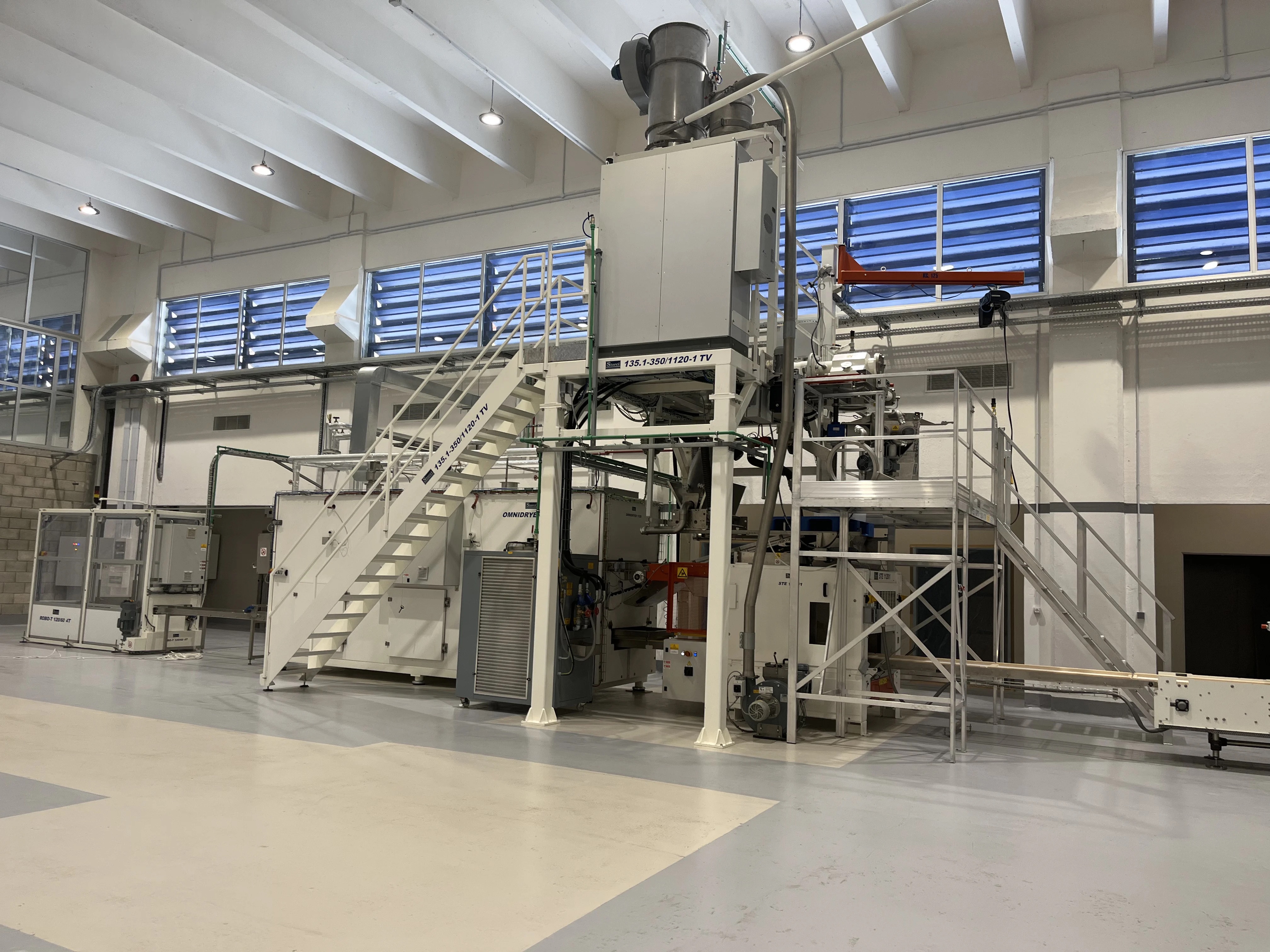
The Nonna pasta production plant is located in Fatqa, Kesrouan. (Credit: DR)
To make quality pasta at affordable prices in Lebanon: that was the goal Edwin Safa, a Lebanese-Brazilian, set when he created, two and a half years ago, his company Nonna.
Nonna means grandmother in Italian, and just like the Lebanese teta, the Italian grandmother is known for her talent in making dishes her family enjoys.
Safa, a 27-year-old fresh graduate in management and marketing, advanced his vision by starting the pasta production in March this year in a new fully robotized factory in Fatqa (Kesrouan), where he employs about 30 people from the area.
The entrepreneur wants his pasta to be the benchmark product for quality pasta, both in terms of taste and price, on the Lebanese market.
Although Nonna pasta is made using specific techniques imported from Italy, the price is still affordable.
“The economic crisis has heavily impacted the purchasing power of households that want to feed themselves rather than eat well. Nonna’s mission is to offer the Lebanese the possibility to eat pasta made with good ingredients, without spending much,” he said.
“Today, the know-how we acquired in producing our pasta allows us to sell it to consumers at $0.72 per pack, which is a fair price,” he added.
Becoming the market leader
Established on a surface of 2,750 square meters, the factory consisted of only one warehouse when Safa decided to buy it two years ago, mainly because its dimensions were suitable for the installation of nine-meter-high machines.
The machines were supplied by Fava, the world leader in manufacturing equipment for pasta factories. Fava also monitors the quality of the pasta marketed by Nonna, and trains its workers on using the machines and making the final product.
The contract between Nonna and Fava is worth millions of dollars, Safa said.
It is with this big investment that the entrepreneur introduced his brand to the market, aiming to acquire as much market share as possible and become the leading pasta producer in Lebanon.
To achieve this goal, Safa made sure the brand would be marketed in all Lebanese supermarkets, as well as in some hotels and restaurants, such as Marinella in Mar Mikhael. He did so by using the distribution network of Super Brasil Company, managed by Denise Safa, his mother.
“I work with suppliers and buyers who have been collaborating with my mother’s company for several years. It is an advantage that allows me to enter the market with a full address book,” he said.
Safa knows he can draw on his mother’s expertise in the marketing of mass-products, such as coffee, to have his project succeed.
For now, Nonna has seven varieties of pasta and hopes to develop three more in the near future. All are made from semolina flour, which is a durum wheat known for its absorption, elasticity and stability.
“One of the main reasons behind the decision to use semolina is that it allows the pasta to absorb the sauce well,” said Safa.
The company gets its semolina from Canada and Italy, among other countries. As for the packaging, Nonna deals with two Lebanese companies: Unipack and FPI.
 The pasta machines are nine meters high. (Credit: DR)
The pasta machines are nine meters high. (Credit: DR)
Growth in demand
Safa ran a large risk when he took the decision to launch a pasta production business two and a half years ago in the midst of Lebanon’s economic and financial collapse. In fact, according to Fransabank’s latest report, Lebanon’s consumer price index (CPI) between 2021 and 2022 in the supermarket sector increased 2.5 times. However, the depreciation of the lira, which has lost more than 98 percent of its value against the US dollar on the parallel market, is not the only challenge Safa faced.
“This project took longer than expected to be completed due to a number of external factors, such as the long delays in obtaining a building permit, the outbreak of COVID-19 and the lack of political stability. All of this made it difficult to draw up a business plan,” he said.
Nevertheless, Safa said he is untroubled and still believes in his project. “Before the crisis, no Lebanese industrialist managed to become ‘the’ producer of pasta for mass consumption in the country. Therefore, the market leader in Lebanon was none other than the global giant Barilla,” he said. “But buying products like meat has become unaffordable for some households amid the crisis in the past three years. They would rather make pasta until the month is over.”
According to Lebanese Customs figures, pasta imports hit a peak in 2020 with 41,267 tons. This was extraordinary, especially given that Lebanon’s pasta imports averaged 30,000 tons per year over the past five years.
This growth in demand has resulted in new pasta brands entering the market, both foreign and Lebanese, such as Del Libano, BRB and PLNTY.
“Today, we find in supermarkets pasta made by Turkish companies, which are certainly inexpensive but of lower quality, or locally produced pasta that are made with Lebanese wheat that does not bring the ultimate taste,” said Safa, arguing that Nonna distinguishes itself from its competitors by its ability to combine taste and price.
Safa remains optimistic that the situation in the country will improve. He even anticipates that his investment will start to be profitable “within four years.” For the time being, the price dollarization in supermarkets allows him to count on a stable currency income in order to pay his employees, his suppliers and the rest of his expenses.
By taking such a step, the entrepreneur wants to encourage young Lebanese to believe in their country, and in themselves, so that other projects like his can flourish.
This article was originally published in French in L'Orient-Le Jour. Translation by Joelle El Khoury.
- A culinary journey from Beirut to Brussels cooks up tradition, love and teta's recipes
- In Tripoli’s Bab al-Tabbaneh and Jabal Mohsen, ex-rival fighters light up former frontlines with solar energy
- Savvy Element: Finding a niche in the local self-care and home-care market, despite Lebanon’s crisis